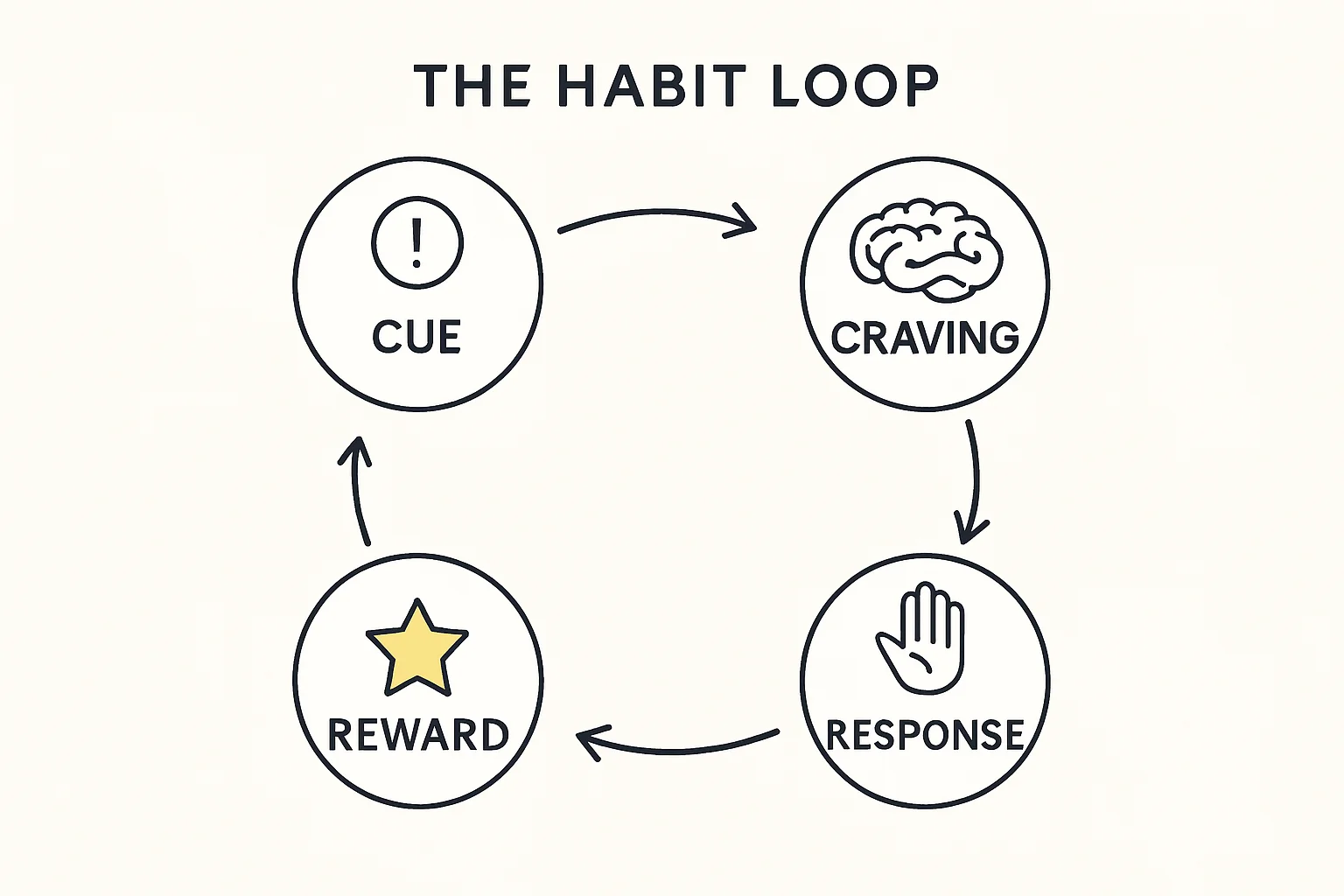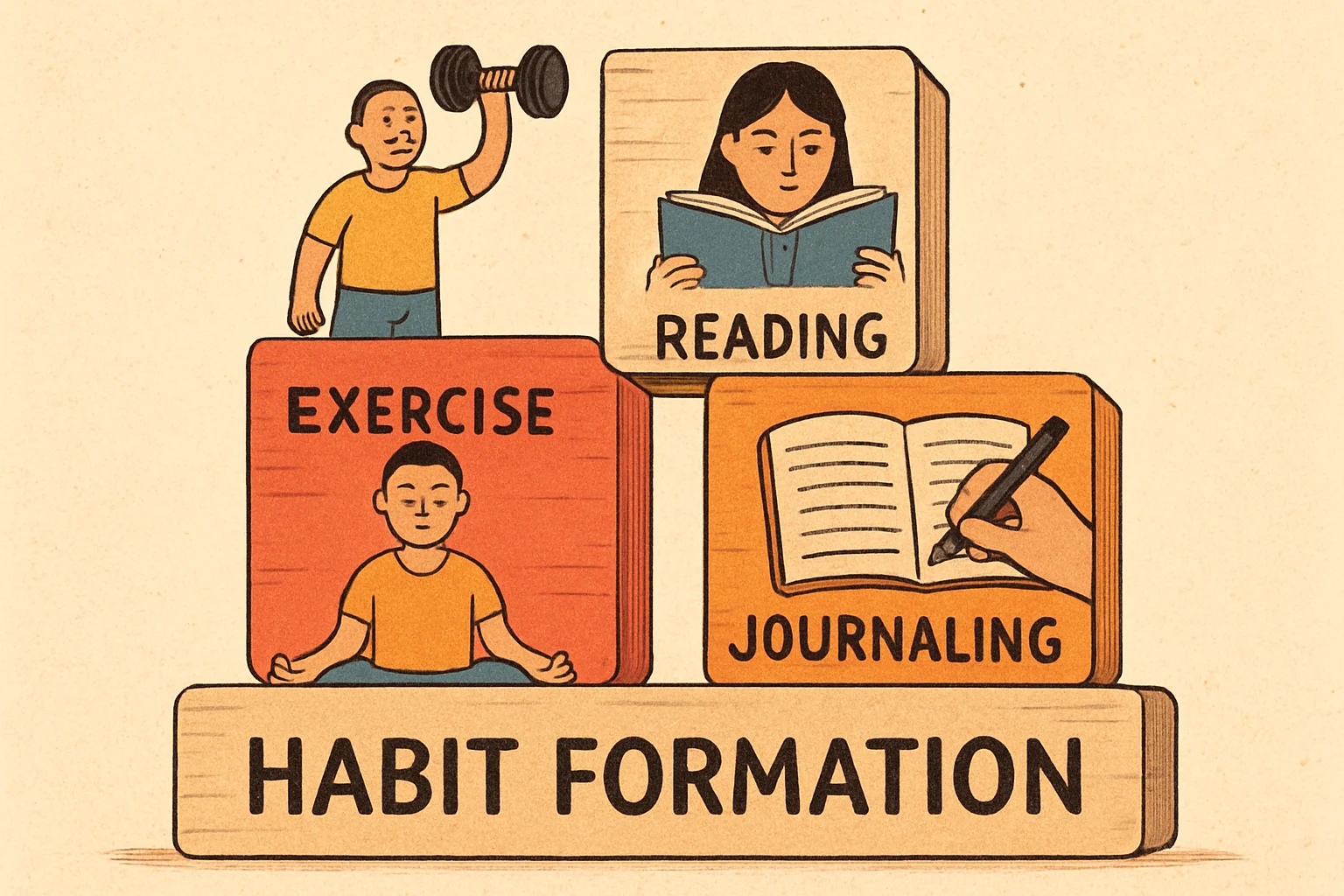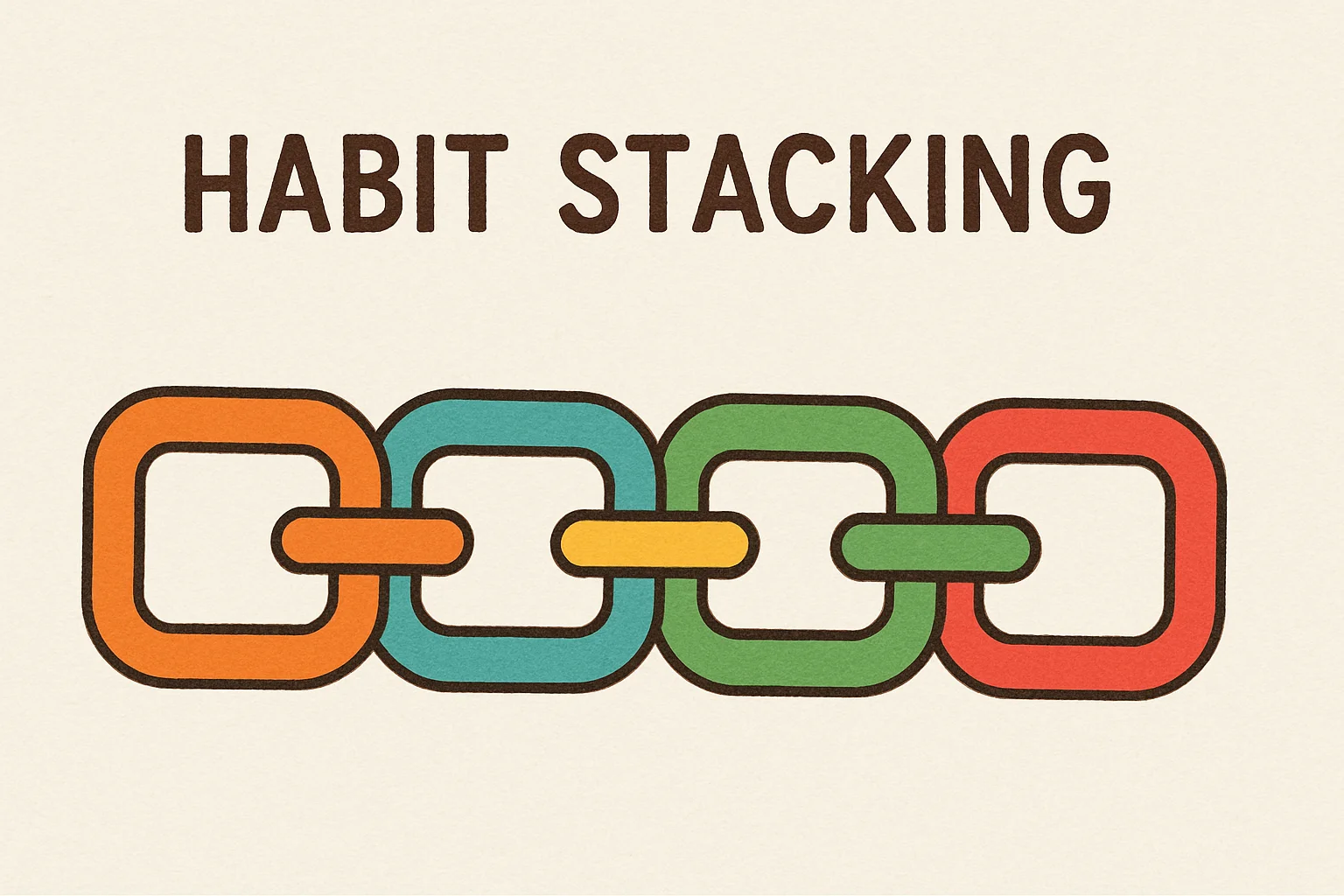Written by the Kairu Team
This article was created by the Kairu team. Kairu helps you stay focused and productive with smart tools, insights, and community support.
Learn more and try Kairu freeBuilding Daily Habits: The Science of Lasting Change
Discover the neuroscience behind habit formation and learn proven strategies to build habits that stick and transform your life.
Habits are the compound interest of self-improvement. Small daily actions, when repeated consistently, create extraordinary results over time. Whether you want to exercise regularly, read more, meditate, or develop any positive behavior, understanding how habits work is the key to lasting change.
This comprehensive guide will teach you the science of habit formation, practical strategies for building new habits, and techniques for breaking unwanted ones. You'll learn how to create systems that make good habits inevitable and bad habits impossible.

A person writing in a journal with a habit tracker visible
The Science of Habit Formation
Understanding how habits work is the first step to changing them. Every habit follows the same neurological pattern:

The Habit Loop cycle
The Habit Loop
Every habit consists of four components:
- Cue: The trigger that initiates the habit
- Craving: The motivational force behind the habit
- Response: The actual habit or behavior
- Reward: The benefit you gain from the habit
This loop becomes automatic through repetition, eventually requiring minimal conscious effort to execute.
The Four Laws of Behavior Change
To build good habits and break bad ones, you need to understand and apply these four laws:
1. Make It Obvious
Design your environment to make good habits obvious and bad habits invisible:
- Implementation intentions: "When X happens, I will do Y"
- Habit stacking: Link new habits to existing ones
- Environment design: Arrange your space to support good habits
- Visual cues: Place reminders where you'll see them
2. Make It Attractive
Increase the motivation to perform good habits:
- Temptation bundling: Pair habits you want with habits you enjoy
- Social proof: Join groups where your desired behavior is normal
- Positive associations: Connect habits to positive emotions
- Reward substitution: Use immediate rewards for long-term benefits
3. Make It Easy
Reduce the friction associated with good habits:
- Two-minute rule: Start with habits that take less than two minutes
- Environment optimization: Prepare your space for success
- Habit shaping: Gradually increase habit difficulty
- Automation: Use technology to reduce decision fatigue
4. Make It Satisfying
Ensure habits provide immediate satisfaction:
- Immediate rewards: Give yourself something positive after habits
- Progress tracking: Visual progress can be its own reward
- Habit contracts: Create accountability systems
- Celebration: Acknowledge wins, no matter how small
Keystone Habits: The Power of Domino Effects
Some habits have a disproportionate impact on other areas of your life:

Keystone habits forming a foundation
Common Keystone Habits
- Exercise: Improves mood, energy, and self-discipline
- Reading: Expands knowledge and improves focus
- Meditation: Reduces stress and increases self-awareness
- Journaling: Provides clarity and emotional processing
- Sleep hygiene: Foundation for all other habits
Habit Stacking: Building on Existing Behaviors
One of the most effective ways to build new habits is to stack them on top of existing ones:

Habit stacking concept
How to Use Habit Stacking
Use this formula: "After [CURRENT HABIT], I will [NEW HABIT]"
- After I pour my morning coffee, I will meditate for 5 minutes
- After I brush my teeth, I will do 10 push-ups
- After I sit down for dinner, I will say one thing I'm grateful for
- After I get into bed, I will read for 10 minutes
Environment Design: Making Good Habits Inevitable
Your environment has a powerful influence on your behavior. Design it to support your goals:

A well-organized workspace designed for productivity
Environment Optimization Strategies
- Reduce friction for good habits: Make desired behaviors as easy as possible
- Increase friction for bad habits: Make unwanted behaviors more difficult
- Use visual cues: Place reminders in obvious locations
- Create dedicated spaces: Designate areas for specific activities
- Remove temptations: Eliminate triggers for bad habits
Habit Tracking: The Power of Measurement
What gets measured gets managed. Tracking your habits provides motivation and insight:
A habit tracker or calendar with checkmarks
Effective Tracking Methods
- Habit tracker apps: Use digital tools for convenience
- Physical calendars: Mark off days when you complete habits
- Streak counters: Focus on maintaining consistency
- Weekly reviews: Reflect on progress and adjust strategies
- Habit journals: Write about your experience and insights
The Role of Social Support
Humans are social creatures, and our habits are heavily influenced by those around us:

Social support for habit building
Building a Supportive Network
- Join communities: Find groups with similar goals
- Find accountability partners: Partner with someone on a similar journey
- Share your goals: Tell others about your habit-building efforts
- Surround yourself with role models: Spend time with people who embody your desired habits
- Create family habits: Build habits that involve your loved ones
Overcoming Common Habit-Building Obstacles
1. Lack of Motivation
Motivation is unreliable. Focus on systems instead:
- Reduce reliance on motivation: Design systems that work regardless of how you feel
- Focus on identity: Become the type of person who performs these behaviors
- Start small: Begin with habits so small they're almost impossible to fail
- Build momentum: Use small wins to create motivation
2. Perfectionism
Don't let perfect be the enemy of good:
- Embrace the "two-minute rule": Start with just two minutes
- Focus on consistency over intensity: Show up every day, even if imperfectly
- Celebrate progress: Acknowledge any step in the right direction
- Maintain perspective: Remember that building habits is a long-term process
3. Not Accounting for Context
Habits are context-dependent:
- Consider your environment: How does your space support or hinder your habits?
- Account for timing: When are you most likely to succeed?
- Plan for obstacles: What might prevent you from performing your habit?
4. Ignoring the Reward
Habits need to be satisfying to stick:
- Provide immediate rewards: Give yourself something positive after completing habits
- Track progress: Visual progress can be its own reward
- Celebrate wins: Acknowledge your achievements, no matter how small
Building Specific Daily Habits
Morning Habits
Start your day with intention:
- Wake up at the same time: Establish a consistent sleep schedule
- Drink water: Hydrate your body after sleep
- Move your body: Light stretching or exercise
- Practice gratitude: Reflect on what you're thankful for
- Plan your day: Set intentions for the hours ahead

Evening Habits
End your day with purpose:
- Review your day: Reflect on accomplishments and lessons learned
- Prepare for tomorrow: Set up your environment and plan
- Practice relaxation: Reading, meditation, or gentle stretching
- Limit screen time: Reduce blue light exposure before bed
- Express gratitude: End the day with appreciation

Peaceful evening routine
Work Habits
Optimize your professional performance:
- Start with your most important task: Tackle priority items first
- Take regular breaks: Use the Pomodoro Technique or similar methods
- Practice deep work: Dedicate focused time to complex tasks
- Review and reflect: End each day with a brief review
- Continuous learning: Dedicate time to skill development
Measuring Habit Success
Track your progress using these metrics:
Quantitative Measures
- Consistency rate: Percentage of days you perform the habit
- Streak length: Number of consecutive days
- Duration: How long you maintain the habit
- Quality: How well you perform the habit
Qualitative Measures
- Identity shift: Do you see yourself differently?
- Automaticity: Does the habit feel effortless?
- Impact: How has the habit improved your life?
- Satisfaction: Do you enjoy performing the habit?
The Long-Term Perspective
Building lasting habits is a marathon, not a sprint:
Phase 1: Initiation (Days 1-7)
- Focus on consistency over quality
- Use maximum motivation and willpower
- Keep habits extremely simple
- Celebrate every completion
Phase 2: Establishment (Days 8-21)
- Gradually increase difficulty
- Focus on quality and consistency
- Begin to see early benefits
- Develop routine and structure
Phase 3: Integration (Days 22-66)
- Habits become more automatic
- Reduce reliance on external motivation
- Experience significant benefits
- Begin to see identity changes
Phase 4: Mastery (Days 67+)
- Habits become part of your identity
- Automatic performance with minimal effort
- Significant life improvements
- Ability to teach others
Conclusion
Building daily habits is one of the most powerful ways to transform your life. By understanding the science of habit formation and implementing proven strategies, you can create lasting positive changes that compound over time.
Remember that habits are not about perfection but about consistency. Focus on showing up every day, even if it's just for two minutes. The compound effect of small daily actions will lead to extraordinary results over time.
Start today with one habit that will have the biggest impact on your life. Use the strategies in this guide to make it obvious, attractive, easy, and satisfying. Before you know it, you'll be living the life you've always wanted, one habit at a time.
Ready to transform your life through the power of daily habits?
Choose one habit to start with today and begin your journey toward lasting change.